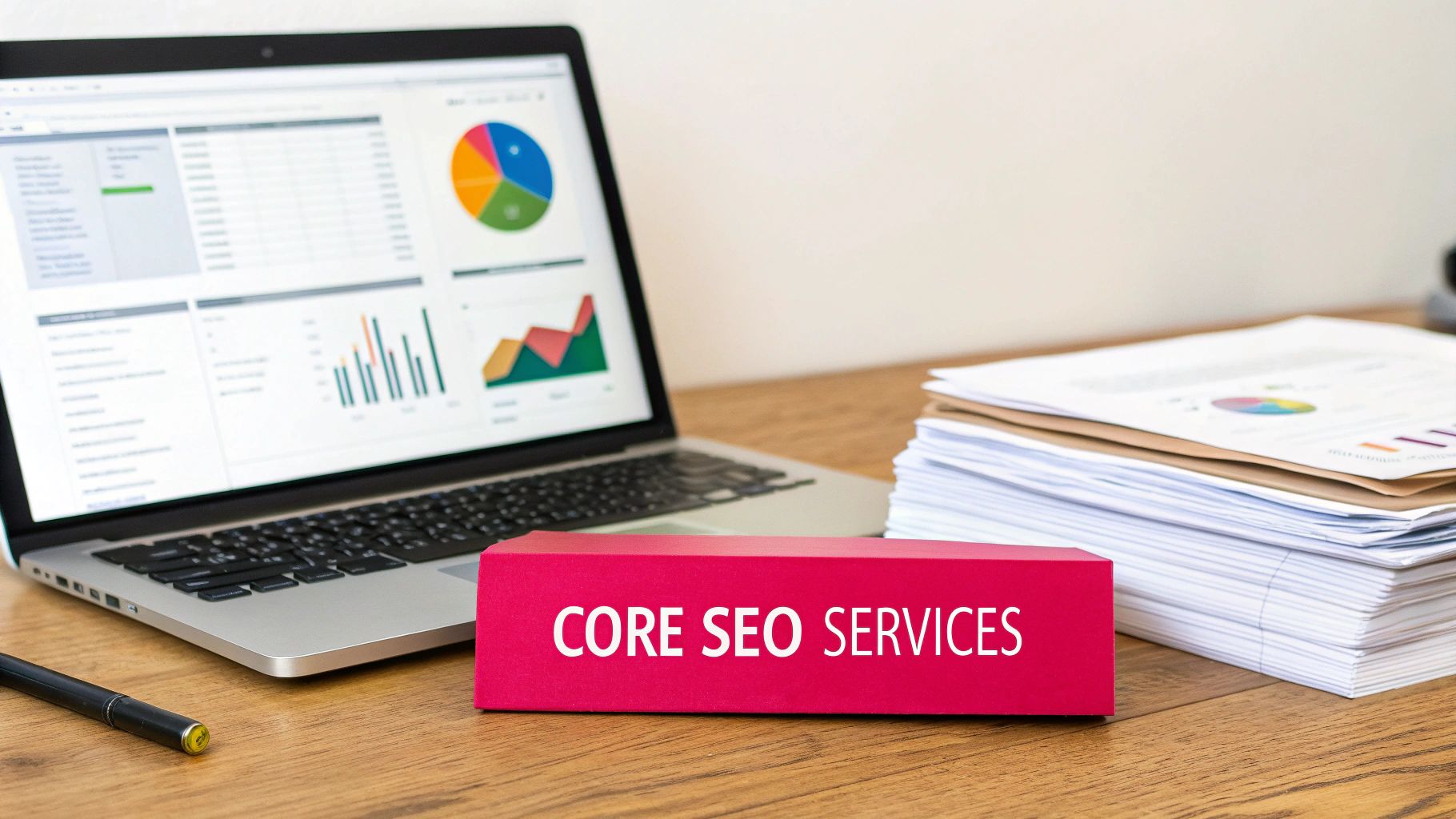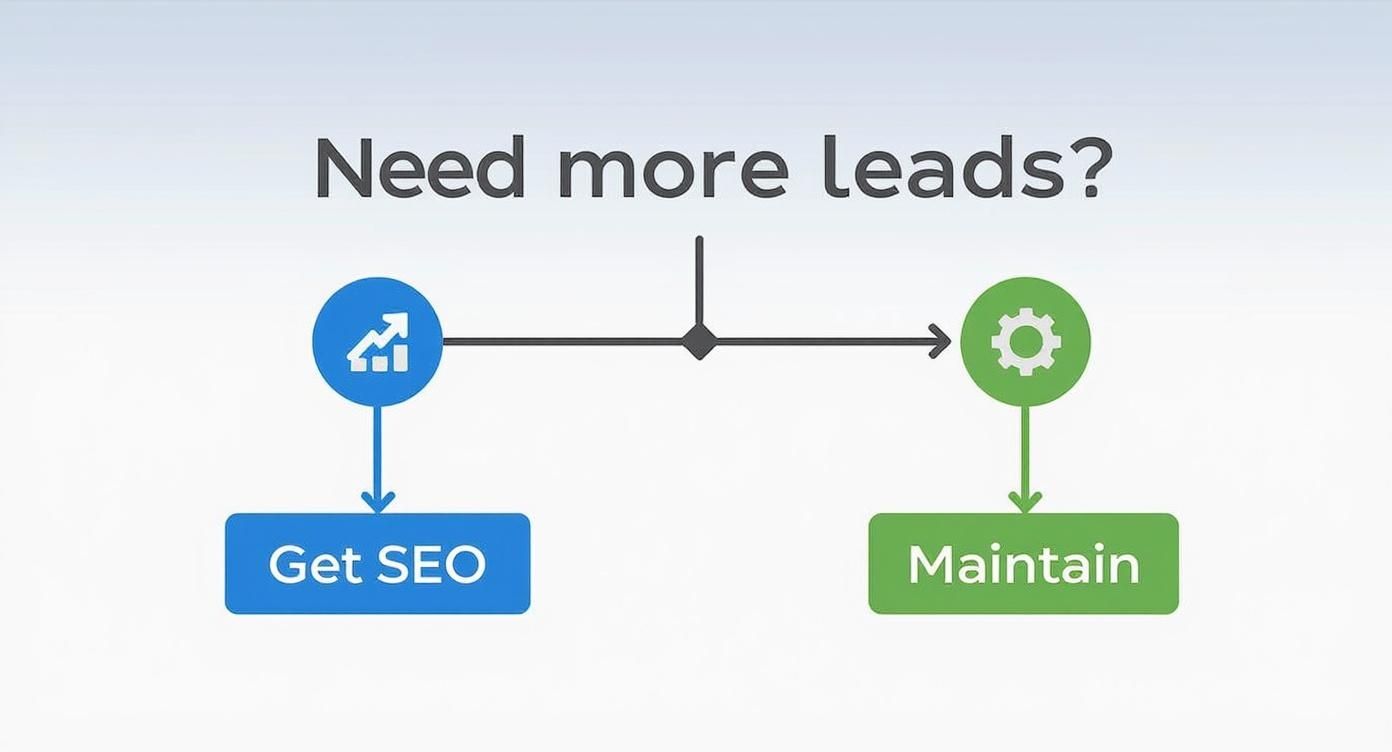So, what exactly is SEO consulting? At its core, it's a professional service where a seasoned expert digs into your website to figure out how to get it seen by more of the right people on search engines like Google.
Think of an SEO consultant as a strategic architect for your online presence. Their job is to make sure your business doesn't just exist online but is easily found by customers who are actively searching for what you offer.
What Does SEO Consulting Actually Involve

It’s easy to think of search engine optimisation (SEO) as some kind of dark art that’s all about jamming keywords into a page. But that’s not really the case. Real SEO is a methodical discipline that blends technical know-how, sharp content strategy, and a deep understanding of the market. It’s about making your website more than just visible—it’s about making it authoritative and trustworthy to both search engines and your future customers.
Here’s an analogy I like: imagine your website is a fantastic book tucked away in a gigantic library. Without a proper cataloguing system, it’s going to get lost on a dusty, forgotten shelf. An SEO consultant is like an expert librarian who makes sure your book is in the right section, has a compelling cover, and gets recommended to every single person looking for it.
Building a Foundation for Growth
A good consultant does more than just "sprinkle in some keywords." They build a solid, strategic foundation designed for long-term, sustainable growth. The whole process starts with a deep dive into your business, your customers, and your competition. The real goal is to figure out what your ideal clients are typing into Google and then position your website as the absolute best answer to their questions.
This foundational work touches on several crucial areas:
- Technical Health: Does your site load in a snap? Does it work perfectly on a phone? Can search engines easily crawl and understand what it’s all about?
- Content Relevance: Is your content genuinely helpful? Does it answer the questions your audience is actually asking and establish you as an authority?
- User Experience: When people land on your site, is it easy to navigate? Is the experience engaging enough to make them stick around and take action?
- Online Authority: What’s your brand’s reputation online? Are other credible websites linking to you, effectively vouching for your expertise?
The whole point of SEO consulting is to get your website perfectly aligned with both search engine algorithms and what users are actually looking for. It's about creating a smooth, clear path from someone's search query to a valuable interaction with your business.
A Data-Driven Approach
Modern SEO is all about the data. There’s no guesswork involved. Businesses are demanding these services more than ever because they need to make smart, informed decisions to get ahead of the competition.
In fact, the market for digital marketing analytics—which includes SEO—was valued at approximately USD 90.36 million and is projected to grow at a compound annual rate of 20.6% through 2031. This trend says it all: the industry is moving toward measurable, results-focused marketing. You can discover more insights about the growth of data-driven marketing on blue.me.
What You're Actually Paying For: A Breakdown of Core SEO Services

When you hire an SEO consultant, you're not just buying some vague promise of "more traffic." You’re investing in a specific set of services that work together to build your website's strength, relevance, and authority over time. It’s a structured process, not a magic trick.
A good way to think about it is like building a house. You need an architect for a solid blueprint (technical SEO), an interior designer to make it appealing (on-page SEO), and a publicist to build its reputation in the neighbourhood (off-page SEO). Each part is critical, and without one, the whole structure suffers.
Technical SEO: Building a Solid Foundation
Before a single word of content is tweaked, a good consultant will pop the bonnet and check your website's engine. This is technical SEO—the absolute bedrock of your entire strategy. If search engines can't easily crawl, understand, and index your site, the world's best content will just sit there, invisible.
The process kicks off with a deep technical audit, which is basically a full diagnostic check-up. The goal is to find and fix problems like:
- Slow Site Speed: Making sure pages load fast before impatient visitors click away.
- Poor Mobile Experience: Ensuring your site works flawlessly on a smartphone.
- Crawlability Issues: Tearing down any walls that block search engines from seeing your content.
- Security Gaps (HTTPS): Protecting user data and showing Google your site is trustworthy.
Nailing these fundamentals doesn't just make Google happy; it makes your human visitors happy, too.
On-Page SEO: Polishing Every Room
Once your website’s foundation is solid, the focus shifts to the content itself. On-page SEO is all about optimising what people actually see and read on your pages to help you rank for the right searches.
This is where detailed keyword research comes into play. It’s about figuring out the exact words and phrases your customers are typing into Google and then weaving them naturally into your website. This isn’t about stuffing keywords into every sentence; it's about creating genuinely helpful content that answers questions and solves problems. Every title tag, heading, and image on the page gets fine-tuned for maximum impact.
A perfectly optimised page does more than just rank. It clearly signals its purpose to both search engines and people, turning a casual click into a real connection.
Off-Page SEO: Earning a Great Reputation
Finally, we have off-page SEO. These are all the things that happen off your website to boost your authority. The main event here is link building, which is the art and science of earning links from other credible websites. Think of each link as a vote of confidence, telling search engines that your site is a legitimate and valuable resource.
This is a long-term game that involves creating content worth sharing, building relationships in your industry, and strategic outreach. It’s about building a reputation that precedes you.
The demand for these comprehensive services in digital marketing is only growing. In fact, market projections for SEO outsourcing show significant growth ahead, as everyone from e-commerce brands to local businesses realises they need this exact blend of technical, content, and authority-building work. You can see the full market analysis on marketreportanalytics.com for more details.
To help you connect these services to real-world results, here’s a quick summary of what each one accomplishes for your business.
Key SEO Consulting Services and Their Business Impact
| SEO Service | Description | Primary Business Impact |
|---|---|---|
| Technical SEO Audit | A comprehensive review of a site's backend health, identifying issues with speed, mobile usability, and indexability. | Improves user experience, reduces bounce rates, and ensures search engines can find and rank your content. |
| Keyword Research | Identifying the specific search terms your target audience uses to find products or services like yours. | Attracts highly relevant traffic, leading to better-qualified leads and customers. |
| On-Page Optimisation | Refining content, title tags, meta descriptions, and headers to align with target keywords and user intent. | Increases rankings for target terms and improves click-through rates from search results. |
| Content Strategy | Planning, creating, and managing content designed to attract, engage, and convert your target audience. | Builds brand authority, attracts organic traffic, and nurtures potential customers through the sales funnel. |
| Link Building | Acquiring high-quality backlinks from reputable websites to build your site's authority and trust signals. | Boosts search engine rankings across the entire site and drives referral traffic from other sources. |
| Local SEO | Optimising your online presence to attract more business from relevant local searches (e.g., Google Maps). | Drives foot traffic to physical locations and increases local customer acquisition. |
Ultimately, these services aren't just isolated tasks. They form a connected strategy where a strong technical foundation allows great content to shine, and that great content earns the authority needed to dominate search results.
What Good SEO Consulting Actually Looks Like
Hiring an SEO consultant should be about getting real-world business results, not just a stack of reports. The biggest, most immediate benefit you'll see is a jump in high-quality organic traffic—meaning you start attracting people who are actively looking for exactly what you sell. It’s not about just getting more clicks; it’s about getting the right clicks.
Think of it this way: a great consultant doesn't just open the floodgates to any old traffic. They're more like a precision guide, carving a direct path for genuinely interested customers right to your website. This laser-focused approach means your marketing pounds are spent on an audience that’s already primed to convert.
From More Visitors to More Revenue
When you get more of the right kind of traffic, you naturally start ranking higher for those "money" keywords—the search terms people use when they're ready to buy. When your business shows up first for a phrase like "emergency plumber in Dubai" or "best corporate law firm," you're catching leads at the very moment they need you.
This kind of strategic visibility is what fuels real business growth. A local service company, for instance, might see its phone start ringing off the hook after a targeted local SEO campaign, sometimes even tripling its customer inquiries. Likewise, an online store can see a direct lift in sales just by ranking for a few specific product searches.
These results aren't just guesswork; they're tracked with clear marketing performance indicators, making sure every single action connects back to a measurable outcome.
The true value of professional SEO guidance is that it turns your website from a passive digital brochure into an active, lead-generating machine that consistently adds to your bottom line.
Building a Brand That Lasts
Beyond the quick wins, consistent SEO work builds something far more valuable in the long run: brand credibility and authority. When your website consistently shows up as the best answer to questions in your field, customers start to see you as the go-to expert. That kind of trust is what creates loyal customers and fuels sustainable growth for years.
This is especially critical in crowded markets. For example, digital ad spending in the MENA region is set to fly past USD 15 billion, with the UAE and Saudi Arabia dominating in hot sectors like tech and luxury goods. In that kind of environment, savvy marketers are leaning hard on performance-based strategies where expert search engine optimisation consulting is what helps them get noticed. You can discover more insights about regional marketing performance on amraandelma.com.
Ultimately, professional SEO isn’t a one-and-done task. It's an ongoing process of building a powerful, authoritative online presence that keeps paying you back for years.
How SEO Consulting Pricing Models Work
When you’re ready to bring in an expert, one of the first questions is always about the cost. Let's pull back the curtain on how SEO consultants typically structure their fees so you can figure out what makes the most sense for your budget and goals.
There’s no single price tag for search engine optimisation consulting. Instead, you'll usually run into three common pricing models: monthly retainers, project-based fees, and hourly rates. Each one is built for a different kind of partnership, from long-term growth campaigns to quick, tactical fixes.
Getting a handle on these options is key to making a smart investment.
Monthly Retainer Agreements
The monthly retainer is the gold standard for ongoing SEO. Think of it like having an SEO expert on your team without adding them to your payroll. You pay a set fee each month, and in return, you get a continuous, dedicated effort covering everything from technical tune-ups and content strategy to link building and performance tracking.
This model is perfect for businesses that are in it for the long haul. SEO isn’t a "set it and forget it" activity; it's a marathon. A retainer ensures your consultant is consistently working to improve your rankings, adapt to Google's latest algorithm updates, and jump on new opportunities as they arise. It’s all about building a deep, strategic partnership.
Project-Based Fees
Have a specific, one-time task you need handled? A project-based fee is likely your best bet. This is where you pay a flat rate for a clearly defined outcome. Common projects include a full-site SEO audit, setting up your Google Business Profile for local search, or executing a targeted campaign to build high-quality backlinks.
The beauty of this model is its simplicity. You know the exact scope, the final deliverable, and the total cost right from the start, which makes budgeting a breeze. It's also a fantastic way to "test drive" a consultant’s work before committing to a longer-term retainer.
This infographic can help you decide if it's the right time to make an investment in SEO.

As the visual points out, if your main objective is to drive more leads, SEO is a direct line to that goal. For other situations, you might just need some light maintenance.
Hourly Consulting Rates
Last but not least, there are hourly rates. This is the most flexible, pay-as-you-go option. It’s perfect when you need to tap into an expert for a specific question, a training session for your in-house team, or just a second opinion on your current strategy.
You only pay for the time you use, making it incredibly cost-effective for quick hits of expertise. While it's not the right fit for a comprehensive, long-term SEO campaign (which needs sustained momentum), it’s invaluable for businesses that just need a little expert guidance to keep moving in the right direction.
To help you visualise the differences, here’s a quick breakdown of how these models stack up against each other.
Comparison of SEO Consulting Pricing Models
A comparative look at the common ways SEO consultants structure their fees, helping you choose the right fit.
| Pricing Model | Best For | Pros | Cons |
|---|---|---|---|
| Monthly Retainer | Businesses seeking long-term, sustainable growth and a strategic partnership. | Consistent effort, holistic strategy, proactive adjustments, deep collaboration. | Higher ongoing commitment, results build over time. |
| Project-Based | Businesses with a specific, one-off goal like a site audit or migration. | Clear scope, fixed cost, defined outcome, great for testing a consultant. | No ongoing support, limited to the initial scope. |
| Hourly Rate | Quick consultations, team training, or expert advice on a specific issue. | High flexibility, cost-effective for small tasks, pay only for time used. | Not suitable for full campaigns, can be unpredictable for budgeting. |
Ultimately, choosing a pricing model isn't just about the numbers. It’s about finding a structure that aligns with your business goals and the kind of relationship you want to build with your consultant. The right fit will support your objectives, whether that's steady, long-term growth, a single strategic fix, or having an expert on call.
Choosing the Right SEO Consulting Partner

Picking an SEO consultant is a lot like hiring a guide for a mountain expedition. You need someone who doesn't just know the trails but can also read the weather, understand the terrain of search algorithms, and pivot when things change unexpectedly. The wrong partner can leave you lost and spinning your wheels.
The best consultants are a rare mix of technical wizard and clear communicator. They should be able to translate complex data into a simple roadmap, so you always know your current position and the next steps on your journey. Think of them as an extension of your team, not just another vendor on the payroll.
Key Criteria for Evaluation
To find a partner who truly clicks with your business, focus on a few core areas:
- Proven Industry Experience: Look for consultants who have case studies and success stories in your specific niche or a similar one. A track record of real-world results is worth more than any sales pitch.
- Transparent Reporting: You shouldn't need a decoder ring to understand their reports. They should be clear, straightforward, and delivered consistently.
- Adaptive Strategy: Search engines are constantly evolving. A great consultant doesn't just react to algorithm updates; they anticipate them and build a resilient strategy that can weather any storm.
"A good SEO consultant doesn't predict the future; they prepare you for change." – Industry Expert
| Criterion | What to Look For | Why It Matters |
|---|---|---|
| Industry Case Studies | Timeline, outcomes, industries | Validates expertise in your sector |
| Reporting Framework | Dashboards, frequency, format | Ensures clarity and accountability |
| Algorithm Adaptation | Response plans, update log | Maintains ranking during changes |
| Communication Style | Meeting cadence, channels used | Keeps you in the loop at every stage |
A simple checklist can keep your evaluation process organised.
- Dig into their portfolio. You're looking for stories of tangible, measurable growth.
- Ask for recent references and actually follow up with them.
- Check for any certifications or partnerships that signal credibility.
Once you’ve vetted their credentials, it's all about the human element. A consultant whose work style and pace match yours will feel like a natural fit from day one.
Asking the Right Questions
With a shortlist in hand, it's time to dig deeper. These questions will help you separate the talkers from the doers:
- How do you monitor and respond to Google algorithm updates?
- Can you walk me through a recent client success, including the specific metrics you achieved?
- What tools and processes do you use for ongoing performance tracking?
- How do you define and measure success for a business with my specific goals?
Getting clear answers here helps prevent nasty surprises down the road. It also gives you a feel for their confidence and transparency.
Think of it this way: if SEO changes are uncharted waters, you want a ship’s captain who has navigated these currents before, not one who is just learning the ropes.
Finally, let's talk budget. Pricing can range from monthly retainers to project-based fees or even hourly rates. Make sure you choose a model that aligns with your timeline and what you're comfortable investing.
Selecting a consultant is not a one-off task but a collaboration that evolves. Regular check-ins and mutual feedback ensure you remain on course.
Want to learn more? We put together a complete guide to help you compare your options and make the best choice.
Check out our guide to choosing an SEO company
By using a clear framework and asking the right questions, you can find a partner who will steer your online presence toward real, sustainable success. The right SEO consultant is out there, ready to help you grow.
Common Questions About SEO Consulting
Jumping into the world of SEO consulting naturally brings up a lot of questions. Getting clear, straightforward answers is the first step toward setting the right expectations and finding an expert you can trust.
Let's walk through some of the most common things business owners ask. My goal here is to give you direct, practical answers so you can move forward with confidence.
How Long Until I See Real SEO Results?
This is the big one, right? Everyone wants to know when the magic happens. The most honest answer I can give is: it depends. SEO is a long-term strategy, not an overnight fix. While you'll likely see some small wins in the first few months—like your site running faster or ranking for a few new keywords—the really meaningful results take time.
For most businesses, you're looking at a timeline of four to twelve months to see a significant, measurable impact on your traffic and leads. Why such a wide range? A few key things come into play:
- Your website's starting point: A brand-new website is like starting from scratch. It takes time to build trust and authority with Google. An established site with some history often has a head start.
- How competitive your industry is: If you're a local plumber, ranking will be a different challenge than if you're a national insurance company. The more competition, the more effort it takes.
- The resources you put in: A more aggressive and well-funded SEO campaign, with consistent content and link building, will almost always get you there faster.
I always tell my clients to think of it like planting a garden. You can’t just throw seeds on the ground and expect a harvest the next day. It needs consistent care—watering, weeding, and sunshine—before it starts to flourish. SEO is the same; it's all about building sustainable growth that pays off for years to come.
Should I Hire a Freelancer or an Agency?
This is another classic crossroads for business owners. There's no single "right" answer here. The best choice really comes down to your specific needs, your budget, and the kind of partnership you're looking for.
A freelance SEO consultant can be a fantastic choice. You get a highly personalised, one-on-one relationship, which is perfect for small businesses or companies that just need deep expertise in one specific area of SEO. They tend to be more flexible and often more budget-friendly.
On the other hand, an SEO agency brings a whole team to the party. You're not just getting one person; you're getting specialists in technical SEO, content strategy, link building, and data analysis. An agency is usually a better fit for larger companies or complex projects that need a lot of different skills and a bigger team to execute the strategy.
The most important thing is to find a partner who "gets" your business goals. Whether that’s a dedicated freelancer or a full-service agency, the relationship should be a true collaboration focused on getting you real, measurable results.
What Is the Difference Between SEO and SEM?
It's easy to get these two mixed up, as people often use them interchangeably. But they're definitely not the same thing. When trying to get more visible online, people often ask about the key differences between paid search and organic search.
Here's a simple way to break it down:
SEO (Search Engine Optimisation) is all about earning your spot in the search results. It’s the art and science of getting organic—or unpaid—traffic from search engines like Google. You're playing the long game, building your site's authority and relevance so it ranks naturally.
SEM (Search Engine Marketing) is the umbrella term that covers both organic SEO and paid advertising (like Google Ads). So, while SEO is a huge piece of the SEM puzzle, SEM also includes pay-per-click (PPC) campaigns where you buy ad space to get your site to the top of the results page instantly.
Ready to turn your website into a powerful growth engine? The team at Grassroots Creative Agency specialises in data-driven search engine optimisation consulting that delivers real, measurable results. Contact us today to start building a strategy that attracts the right customers and grows your business.








